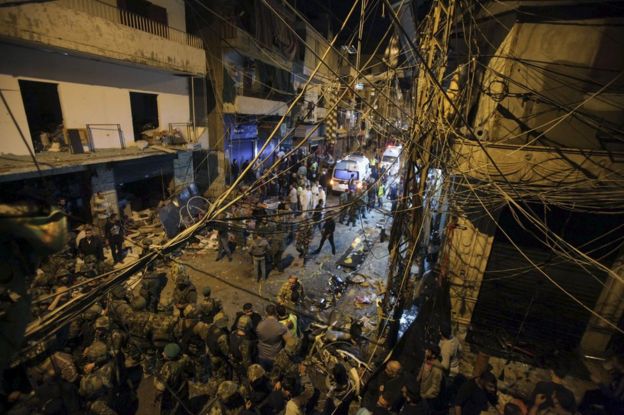Saturday, 14 November 2015
I want to use this tiny platform today to highlight Beirut. ISIL has claimed responsibility for two/three suicide bombings that killed 43 people and wounded another 200 in a Shia area of southern Beirut. The bombs were set off in a busy commercial district, at a time when people were getting off work and families were gathering together. One of the bombs was detonated at the gates of a school. The reason for the bombings seems to be that the area is a Hezbollah stronghold, and Hezbollah has been active in the fight against ISIS/ISIL in Syria. Friday was a day of mourning in Lebanon.
Mentioning these terrorist bombings in Beirut at this time in no way diminishes the suffering of Paris, just as #prayingforparis is not a slam against the pain of Beirut.
But there is an unequal level of interest in the two situations.
It is always shocking to us when violence "comes home." It disrupts our comfort, our generally optimistic, and perhaps myopic, view of reality. We think we are safe. Really, if we get right down to it, we think we are immortal. Until we are confronted by fear, violence, sickness, accident, pain. And then we remember, as every human has ever had to remember, that death is. But we want to put that moment of realisation off as long as possible.
This is difficult for the privileged class of the Western world. We have lived our lives in active denial of this reality, to the point where looking old is one of our society's most embarrassing faux pas. We don't want to look at old, because it reminds us of where we are headed. And when we hear of violent, hateful acts occurring in places that feel like home, that remind us of us, we get real scared. Then angry. Then accusatory. Then violent. Because our illusion has been shattered and we feel threatened, not so much by terrorists as by terror, the terror of an interruption in our "good life", the stark reminder that death is a comin' to us all.
What does that have to do with Beirut?
The reason we don't get shocked about violence in Beirut, the reason we don't change our facebook avatars to reflect Lebanon's colours, is because we expect violence there. This is normalised in our minds, and violence is "appropriate" in that context. We almost can't think of places like Beirut without thinking about violence. Thus, nothing is interrupted in our lives by an act of horrific violence "over there," because we can't even really understand it as an interruption in their lives. They aren't real to us, they are pictures on tv screen of people living lives we can't bring ourselves to imagine. They are already so "other" that their deaths don't really adjust our perception of reality. This is normal.
Understand, please, that I am not speaking of anyone's actual reality in Beirut. I also do not believe that the typical Western view of life in Beirut is in any way accurate. I certainly do not claim to speak on anyone's behalf in that context. I am speaking of how I understand the general perception of such tragedies from the perspective of Western culture, something I do know a little about. Attacks on Paris and places like it make us mad and afraid. Attacks on Beirut and places like it make us sigh, make us resigned to such violence, make us re-confirm our suspicions about "places like that," "people like that". Not for everyone, to be sure. But for enough that it can start to affect things like refugee and immigration policies.
One of the editors of the Charlie Hebdo magazine in France has urged people not to #prayforparis, arguing that we don't need more religion. This betrays a misunderstanding - perhaps a justifiable one, to be sure - of the nature of prayer. I am praying for Paris, and in so doing am seeking the Father's heart for his children. I want to be able to mourn well and to be moved to whatever action I can take. Prayer enable me to do this, and I find this quite natural with regards to France. So please, do #prayforparis.
But also #prayforbeirut. Pray for the Father's heart over his beloved children. Over families that are mourning, schools that have been devastated, businesses that are missing friends and employees today, refugee camps filled with wise and caring and hopeful people who have fled terror and violence only to have it visited upon them or near them yet again in a new and unfamiliar land. People who are also now being blamed for this kind of violence in other parts of the world.
And #prayforyourownheart. Pray that it would be available to those you have previously seen only as "the other".
Subscribe to:
Post Comments (Atom)

No comments:
Post a Comment